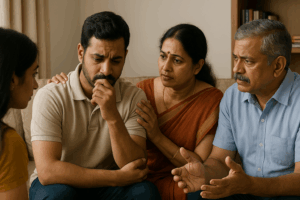How to Support a Family Member Trying to Quit Smoking
 A Guide for Spouses, Parents, Siblings, and Friends
A Guide for Spouses, Parents, Siblings, and Friends
Quitting smoking is one of the hardest — and most life-changing — decisions a person can make.
But it’s not a journey they can always walk alone.
As a family member, your support can make a real difference in whether your loved one succeeds or relapses.
However, helping someone quit isn’t just about reminding them to stop — it’s about understanding the addiction, being emotionally present, and responding to their ups and downs with empathy.
Here’s how you can be their strongest ally.
1. Understand the Nature of Nicotine Addiction
Nicotine isn’t just a habit — it’s a powerful neurobiological addiction.
-
It affects the brain’s reward system, creating dependency.
-
Smokers often need cigarettes to feel “normal,” not just to feel good.
-
Quitting leads to withdrawal symptoms like irritability, anxiety, low mood, and sleep disturbances — not because they’re angry at you, but because their brain is recalibrating.
👉 What You Can Do:
Educate yourself about nicotine addiction and the withdrawal process. This makes your responses more compassionate and less personal.
2. Avoid Nagging or Guilt-Tripping
Statements like:
-
“Why don’t you just stop?”
-
“You’re ruining your health.”
-
“Think about the family.”
…can actually increase stress and push them back into smoking.
👉 What to Say Instead:
-
“I know this is hard — I’m proud of you for trying.”
-
“What can I do today to make it easier?”
-
“Would you like me to remind you, or would you prefer I wait for you to bring it up?”
Support works best when it’s collaborative, not controlling.
3. Celebrate Progress, Not Just Perfection
Every step matters — whether it’s:
-
Smoking fewer cigarettes per day
-
Going a day or a week without smoking
-
Choosing not to smoke during a stressful moment
👉 What You Can Do:
Celebrate milestones with small rewards or affirmations:
-
“One week smoke-free — that’s amazing!”
-
“I know today was tough, but you managed well.”
These positive reinforcements build motivation and self-esteem.
4. Be Prepared for Slip-Ups
Relapse is common — and it doesn’t mean failure.
-
80% of people relapse at least once before quitting for good.
-
Shaming them during a relapse only makes quitting harder in the long run.
👉 What You Can Say:
-
“I know you’re disappointed — but this is part of the process.”
-
“Let’s talk about what triggered it, and how we can handle it differently next time.”
Your non-judgmental presence can turn a relapse into a learning moment.
5. Help Manage Triggers
Triggers can be:
-
Emotional (stress, anxiety, loneliness)
-
Social (friends who smoke, parties)
-
Environmental (smoking areas, routines like post-meal cravings)
👉 What You Can Do:
-
Create a smoke-free home environment.
-
Encourage alternatives like chewing gum, deep breathing, or a walk when a craving hits.
-
Plan “trigger-free” activities — board games, movies, or exercise together.
Even helping them avoid their smoking zones or rituals can make a difference.
6. Encourage Professional Help
Many people need more than willpower.
Encourage them to consult a professional who can offer:
-
Nicotine Replacement Therapy (NRT)
-
Medications like bupropion or varenicline
-
Behavioral counseling or group therapy
👉 How to Help:
-
Offer to help find a smoking cessation clinic or doctor.
-
Accompany them to their first consultation if they’re anxious.
-
Let them know seeking help is strength, not weakness.
At our clinic, we offer structured, evidence-based quit plans with medical and psychological support. [📞 8595155808 | 🌐 srinivasaiims.com]
7. Be Their Anchor During Mood Swings
Nicotine withdrawal can cause:
-
Irritability
-
Anger
-
Sadness
-
Fatigue
This is temporary, but very real.
👉 What You Can Do:
-
Remind yourself it’s not personal.
-
Offer space when needed, and presence when wanted.
-
Encourage healthy coping (journaling, music, walks, deep breathing).
8. Set an Example (if you smoke too)
If you also smoke:
-
Consider quitting together — people who quit in pairs are more likely to succeed.
-
At least avoid smoking around them to reduce temptation.
If you’re smoke-free:
-
Don’t make it a superiority issue — just be a source of hope and encouragement.
Final Words
Your belief in them can sometimes matter more than their belief in themselves.
Supporting a loved one through smoking cessation is about:
-
Patience
-
Understanding
-
Encouragement
-
And showing up — again and again — even when it’s hard
You don’t have to fix it all.
Just stand beside them. That’s often enough.
Need Help? We’re Here.
At our centers in Chennai, we offer family-inclusive smoking cessation programs that include:
-
Individual quit plans
-
Medication guidance
-
Behavioral therapy
-
Family counseling and education
Led by Dr. Srinivas Rajkumar T, MD (AIIMS, New Delhi) — one of Chennai’s leading psychiatrists with expertise in deaddiction and behavioral health.
Appointments: 📞 8595155808
Locations: Apollo Clinic, Velachery | MGM Malar Hospital, Adyar
Website: 🌐 srinivasaiims.com
Together, we can build a smoke-free future — one day at a time.